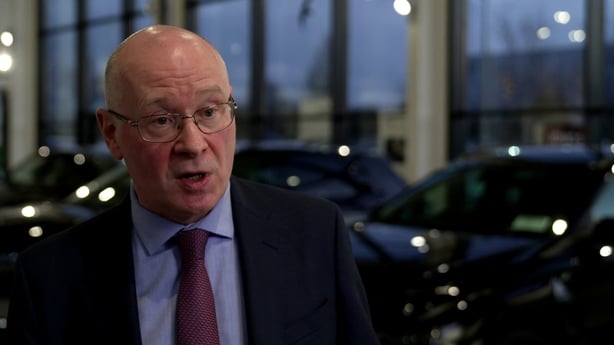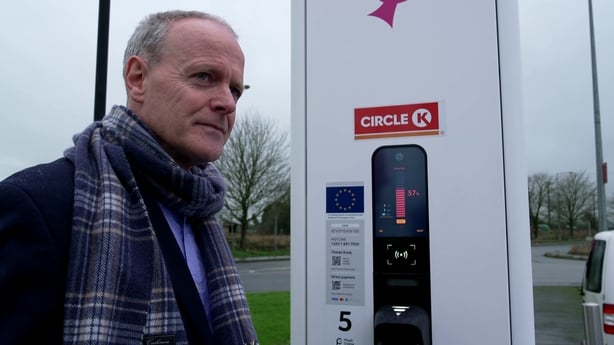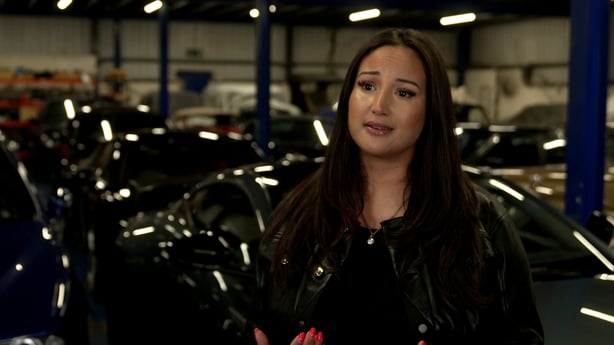Some 25% fewer electric vehicles were registered in 2024 compared to the previous year, according to the Society of the Irish Motor Industry. Was that a blip, or have electrical vehicle sales plateaued? And what's the forecast for electric vehicle sales in 2025?
A browse through RTÉ’s archives shows that it is now 44 years since journalist Caroline Erskine did one of the first reports about electric car sales in Ireland.
"We've had electric milk floats, we've had electric bread vans, but this is the first all-electric motor car to go on sale in Ireland," she said in the 1981 news report.
The tiny two-seater car cost £5,900 punts. It was suggested that they could be the answer for commuters looking to avoid spiralling petrol costs.
WATCH: The first electrically powered plug-in car goes on sale in Ireland
But not everyone back then wanted to get their hands on the angular two-seater with a top speed of 40 miles per hour and a 40 mile range. Yet, as more and more models have been released in recent years, the number of electric vehicles on the roads has grown markedly.
"17,500 new EVs were sold [in 2024]," says Brian Cooke, Director General of the Society of the Irish Motor Industry (SIMI). "If you had said three or four years ago that's what the size EV market would be, you would have said that was a good thing."
Despite that, he accepts 2024 was undoubtedly a "disappointing year for electric vehicle sales. The numbers don't lie."
"I think what we saw was, up to the end of 2023, we had the early adopters, people who were enthusiastic about new technologies buying electric vehicles. Now we've moved into the mass market, and I think those new customers, they need a bit more convincing," Mr Cooke said.

University College Cork (UCC) academic Dr John Hayes broadly agrees. He believes 2025 is going to be a significant year for EV sales.
Based in the UCC Department of Electrical and Electronic Engineering, he worked in the US electric car industry in the 1990s. After he returned home to Cork in 2001, he bought the first Toyota Prius hybrid electric car to arrive in Ireland.
He has been driving EVs ever since, and says global competition is causing prices to drop, which will encourage more sales.
"There are 34 companies selling over 100 models in this country. The competition between the Chinese manufacturers and Tesla is driving prices down throughout the entire industry," Dr Hayes said.
"The European manufacturers, the American manufacturers, everybody is having to drop prices. There's actually some great value out there in electric cars. It's not unusual to have seen the price drop maybe €10,000 in the last two years for a high-quality electric car."
"Not only have the prices dropped, but the batteries have also got bigger, the range has got longer, and the quality has got better," he added.
"We have Hyundai selling the Inster in this coming year for less than €20,000. We have Dacia selling the Spring for less than €20,000. I expect that this year we will likely see Tesla unveil a car onto the market that will come in for less than €30,000."

Yet some people in the motor industry are not as positive in their outlook about EV sales.
Nadia Adan, owner of Ashford Motors in Wicklow, no longer accepts EVs as trade-ins and has vowed not to sell them for the foreseeable future.
She sells mid- to high-end brands such as Volkswagen, Mercedes and BMW ranging from €40,000 to €60,000 for the mid-range cars and over €100,000 for higher spec cars. She said she sold her dream car, a Lamborghini Aventador for €300,000 last year.
Ms Adan believes there is an over-supply of EVs in the Irish market currently, and points to key reasons for this.
"The biggest one is infrastructure. Norway is a great example. They've 25,000 charging points in Norway, and we the same population as them, and we only have around 1,800," she said.
She also points to Government incentives as an issue.
"There was a bigger grant towards EVs, and that's been sliced. The Government are not really doing enough to address these issues to actually pick up EV sales," Ms Adan said.

She also points to a dearth of mechanics who know how to deal with EV batteries as another concern.
"What do we do for me, when I'm selling a second-hand EV that's out of manufacturer warranty and there's an issue with the battery - and you can't get the right type of skilled labour? Parts, technology, everything, is still so new," Ms Adan added.
Concern around price depreciation is often a deterrent for people considering buying an EV, according to the Wicklow-based car dealer.
"There was a whole load of new entries into the market that bought EVs, but now they've come into the second-hand car market and the residual values have just gone down so much," Ms Adan said.
"If I have Mary and Joe down the road buying a car off me, and then a year later, they come trade it back into me and I have to give them such a terrible offer. That ruins my reputation as an independent, and I don't have the support of a manufacturer to give them back the cars if it doesn't work out."
"I would have to absorb that cost, which myself being a small business, I just cannot do. When I saw this happening, I just removed myself from the mix."
Nadia is committed to selling Internal Combustion Engine (ICE) cars but that could change at some point in the future.
"I'd be looking at is to look at them like a white good, a five-year good, because that's all they are. Once they do start to go after manufacturer warranty, they start to really hit higher costs if there's an issue with them," Ms Adan said.
"I would look at it like a second-hand iPhone. No one's going to go out there and buy a second-hand iPhone. They want a brand-new iPhone all the time," she added.
The reality for a lot of Irish motorists is that they cannot afford to buy a new EV.
SIMI Director General Brian Cooke believes the success of EVs will be down to when a used EV car market is established.
"To get to a used car market, we need to sell more new cars," he told Prime Time.
"This time last year, we had about 20,000 three-year-old EVs on the road. Now we've nearly 40,000, and next year we'll have nearly 60,000. I think over the next 12 to 18 months, we'll actually see the establishment of a used EV market, which will bring more people to the EV table."
"We would expect to see the EV market start to recover. It already has. Our forecasts are that we will get back up to at least 20,000 electric vehicles. Hopefully, we'll get close to the nearly 23,000 we sold in 2023. So, we do think we've turned the corner. I think it will increase in 2025 and hopefully increase every year after that."
Conor McMorrow and Sallyanne Godson's report will be on Prime Time on 7 January at 9.35pm on RTÉ One and RTÉ Player.





